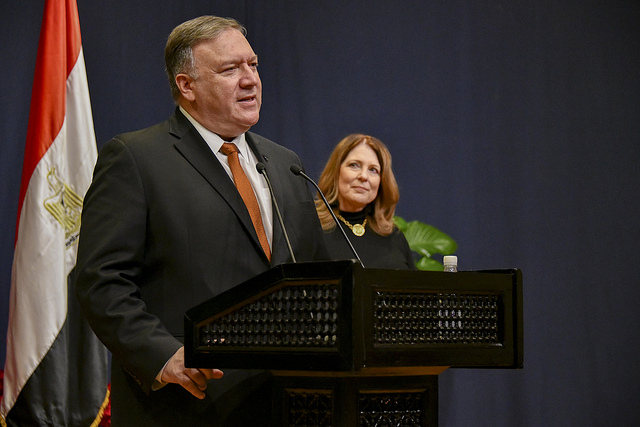
Every now and then, a US political leader descends on Cairo to deliver an address outlining America’s policy objectives in the ever-challenging Middle East. In June 2005 the secretary of state, Condoleezza Rice, made waves with a speech that firmly put the promotion of freedom and democracy on the agenda.
‘For 60 years’, Rice observed, ‘the United States pursued stability at the expense of democracy in this region … and we achieved neither. Now, we are taking a different course. We are supporting the democratic aspirations of all people.’ And to those who would accuse the US of imposing democracy on the region, she responded, ‘In fact, the opposite is true. Democracy is never imposed. It is tyranny that must be imposed.’
Needless to say, a number of regional leaders were distinctly uncomfortable with the speech, given that it came just two years after the US invasion of Iraq. But Rice was also following up on the 2002 Arab Human Development Report, which had highlighted the region’s miserable conditions and made a clear case for long-term structural reforms.
Four years later, it was newly elected President Barack Obama’s turn to head to Cairo. In his speech, Obama downplayed the promotion of democracy and emphasised the need for a more harmonious relationship between the US and the entire Muslim world, while also calling for a resolution to regional conflicts.
On the Israel–Palestine question, whereas Rice’s speech had embraced a ‘vision of two democratic states living side by side in peace and security’, Obama went further, describing the Palestinians’ situation as ‘intolerable’ and harshly criticising Israel’s settlement activities.
In Obama’s view, the unresolved Israeli–Palestinian conflict posed the second-largest danger to the region, after ‘violent extremism’. Then came Iran’s nuclear program and the threat of a regional arms race, followed by the absence of democracy, the lack of religious freedom, and economic underdevelopment. He envisioned ‘a world where Israelis and Palestinians are each secure in a state of their own … and the rights of all God’s children are respected’.
But it wasn’t to be. Despite intense diplomatic efforts by Secretary of State John Kerry during Obama’s second term, a peace settlement could not be reached. In his farewell address in December 2016, Kerry put the blame squarely on Israeli Prime Minister Benjamin Netanyahu.
One can debate whether Rice’s or Obama’s words played any role in the 2011 Arab Spring, which began in Tunisia and found a symbolic home in Cairo’s Tahrir Square. But it’s clear that those who took to the streets to demand democracy and representative government were genuinely hopeful for the future. Again, it wasn’t to be. In almost all of the countries where people mobilised to demand political and economic reform, the result was counterrevolution, repression and, in Syria’s case, civil war.
Obama failed to avert the disaster in Syria. But, pursuing his previously stated priorities, he did help to prevent a devastating region-wide war by concluding the 2015 nuclear agreement with Iran. That, in turn, opened the door for further engagement with Iran on all other issues of concern, including human rights.
This month, the current US secretary of state, Mike Pompeo, traveled to Cairo to deliver his own speech. And he made clear that the Trump administration’s approach to the region represents a stark departure from that of its predecessors.
Pompeo started by attacking Obama for having based his strategy on ‘fundamental misunderstandings’ of history. He then declared that US policy would henceforth focus solely on destroying the two evils of the Middle East: ‘radical Islam’ and ‘Iran’s wave of regional destruction and global campaigns of terror’.
Gone was any talk about democracy and reform. On the question of peace between Israel and Palestine, Pompeo limited himself to mentioning Trump’s counterproductive decision to move the US embassy to Jerusalem. The speech made no mention of overcoming divisions, building bridges and opening up the region for economic development, but it did offer plenty of implicit praise for dictators who have managed to deliver stability. In effect, America’s approach to the region has come full circle: Pompeo espoused precisely the failed policy that Rice repudiated in 2005.
On the key issue of Iran, the speech revealed the administration’s policy to be a barren one of confrontation for its own sake. Iran, in Pompeo’s telling, is the source of every problem in the region. Without profound political change there, he declared, ‘The nations of the Middle East will never enjoy security, achieve economic stability, or advance the dreams of their people.’
This is nonsense. The Iranian regime has nothing to do with the brutal repression in Egypt, the severe structural issues in Saudi Arabia, or the Israel–Palestine deadlock. Moreover, Iran is a sworn enemy of Islamic State, and has committed resources to that fight.
All told, the Pompeo doctrine seems to amount to unlimited confrontation with Iran, strong support for stable authoritarian regimes, neglect of the Palestinian issue and a complete disinterest in representative governance and reform. The Trump administration is not just ignoring the current escalation of tensions throughout the region; it is actively supporting it.
From a European perspective, this is profoundly worrying. Conflicts in the Middle East have far-reaching implications for our own security and stability. In the absence of US leadership, Europe needs its own policy for preserving the Iran nuclear deal and promoting a two-state solution of the Israel–Palestine conflict. The European Union has been both vocal and clear on these two points. But it must translate these priorities into a comprehensive vision of reform and reconciliation for the entire region.
Unlike the speeches by Rice and Obama, Pompeo’s address is unlikely to inspire anyone outside a small circle of regional authoritarians. With the US having abandoned moral leadership, it is up to Europe to show those yearning for democracy and reform that they are not alone.

